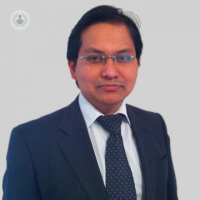Facial paralysis explained
Written by:Facial palsy is an ailment that affects approximately 25,000 individuals in the UK every year, resulting from a weakness of the facial muscles. We speak to award-winning consultant plastic surgeon Mr Ruben Kannan, who explains the first signs and symptoms and treatment options, including surgery.

What is facial palsy?
Facial palsy typically presents as facial muscle paralysis affecting half the face that comes on suddenly and can last from hours to days. While stroke is one cause of facial palsy, the main cause is Bell’s palsy, usually due to a viral infection. Most cases of facial palsy recover some facial function within six months, however, one-third have long-standing after-effects.
What are the signs and symptoms of facial palsy?
Patients suffering from facial palsy often complain of long-term tightness around the eye, cheek stiffness, eye-watering, neck tightness and synkinesis (a symptom wherein, for example, when you smile, one eye winks uncontrollably).
Unfortunately, these symptoms can worsen over time and have a detrimental impact on both physical and mental health. Recent advances have shown that customised facial therapy can alleviate many of the symptoms effectively.
What are the first steps to treat Bell’s palsy?
The most essential step towards treating Bell’s palsy is to get oral steroids, within 48 hours of signs showing. Additionally, in some cases, the patient may require antiviral medication, and then seek a specialist, if necessary.
What surgery can be used to treat facial palsy?
For people with significant facial and neck tightness, a state-of-the-art surgery developed in the US, called selective neurolysis, can be used to reduce synkinetic movements (unwanted contractions of the face during an attempt to move) and recalibrate the face. This is now available in the UK, both via the NHS and privately.
Images which I have taken of my patients following the surgery have demonstrated that selective neurolysis can be a powerful tool in relieving symptoms by freeing up the face and alleviating stiffness. It also has the ability to relieve pain in the face and neck. With the appropriate facial rehabilitation regimen following surgery, this can even translate into improved smiles and reduced synkinesis.
It must be noted that Bell’s palsy, even in the most severe cases, will show some return of facial movement within six months. If this is not the case, or if the palsy is gradual or only affecting part of the face, you should contact your GP or get a referral to a facial palsy specialist (via Facial Palsy UK) as soon as possible, in order to rule out other causes.
*This article was originally published on the 9th of September 2023 in The Telegraph newspaper.
If you are suffering from facial paralysis and would like to book a consultation with Mr Kannan, simply visit his Top Doctors profile today.


